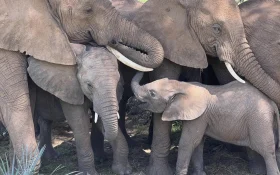In a groundbreaking study published Monday, researchers discovered that African elephants use individual names to call each other and respond accordingly—a behavior rarely seen in wild animals.
These names are incorporated into the low rumbles that elephants use to communicate over long distances across the savanna. Scientists believe that animals with complex social structures and family groups that frequently separate and reunite are more likely to use individual names.
Stuart Pimm, an ecologist at Duke University who was not involved in the study, explained, “If you’re looking after a large family, you’ve got to be able to say, ‘Hey, Virginia, get over here!'”
It is extremely uncommon for wild animals to use unique names to call each other. Humans, of course, have names, and our dogs respond when called by their names. Baby dolphins create their own names, known as signature whistles, and parrots may also use names. Interestingly, these naming species also possess the ability to learn and pronounce new sounds throughout their lives—a rare talent shared by elephants.
For the study, which was published in Nature Ecology & Evolution, biologists used machine learning to detect the use of names in a sound library of savanna elephant vocalizations recorded at Kenya’s Samburu National Reserve and Amboseli National Park. The researchers followed the elephants in jeeps to observe who called out and who appeared to respond, such as a mother calling to a calf or a matriarch calling to a straggler who later rejoined the family group.
Analyzing only the audio data, the computer model predicted the intended recipient of the call 28% of the time, likely due to the inclusion of its name. When fed meaningless data, the model’s accuracy dropped to just 8%.
Mickey Pardo, a study author and biologist at Cornell University, noted that, like humans, elephants use names but probably not in the majority of their utterances.
To test their results, the researchers played recordings to individual elephants, who responded more energetically, with ears flapping and trunks lifted, to recordings that contained their names. In some cases, elephants completely ignored vocalizations addressed to others.
Co-author and Colorado State University ecologist George Wittemyer, who also serves as a scientific adviser for the nonprofit Save the Elephants, emphasized the importance of this naming behavior in elephant communication and social interactions.
This study has just begun to scratch the surface of understanding the complexities of elephant communication and cognition.
The Associated Press contributed to this article.
